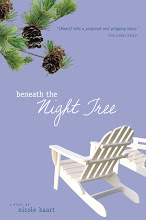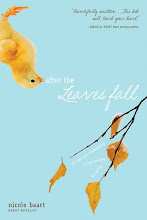Tuesday, July 6, 2010
Fact vs. Fiction
This might come as a surprise to you, but I write fiction. Shocker, I know.
Okay, okay. Of course you know I write fiction. Why bring it up? Because I believe wholeheartedly that the line between fact and fiction is pretty stinkin' fine. Am I suggesting that my Julia character (After the Leaves Fall, Summer Snow, and the upcoming Beneath the Night Tree) is based on my own life? Not at all. I don't have much in common with Julia at all. Maybe, more scandalously, I relate to Abigail (The Moment Between), the somewhat disturbed protagonist of my most recent book. Actually, she's an aberration to me, a total enigma. I wrote about her because I didn't understand her and I wanted to develop empathy for someone that I just didn't get.
So if I'm not writing about myself, why do I think the line between fact and fiction is fine? Because I believe it is impossible to write and not include bits and pieces of yourself. In fact, I might be so bold as to say that you can't be a good writer unless you're willing to bare segments of your soul.
Scary thought. Bits of my soul on display for anyone to read about and dissect? You bet. Anything honest, anything real and moving and potentially changing (even on a very small scale) has to include some sort of sacrifice. For me, that sacrifice comes in the form of little revelations. You read my books, you're going to learn a bit about me--even if the story is far from autobiographical.
Right now I'm working on a book that is framed by a staggering loss. It's a hard book for me to write because I have to daily put myself in the shoes of a woman who has lost her husband. It's not enough for me to simply imagine how she feels, I have to make myself really and truly face the reality of what it would be like to find myself husband-less. It's painful. I don't want to think about that possibility, much less dwell on it to the point of heartache. But her fictional reactions will be based on the tears I've shed trying to put pieces of myself into her life. And I'm weaving in other agonies, other things I've faced even if they don't perfectly relate to my protagonist's situation. It's not fun to dredge that stuff up, especially when I'm working on fiction, not autobiography or even biography.
But I believe that story is powerful. I believe that when we share pieces of ourselves we allow others to deal with their own pain and loss, joy and moments of celebration. It's powerful to be a part of something that matters, that has the promise to reach out and touch another person at a place where they're at (or have been or will be). And I'm willing to weave my fact into my fiction.
How about you? Are you willing to share? Do you allow people to enter into your own struggles and moments of epiphany? Has anyone ever "let you in" and changed things for you?
Subscribe to:
Post Comments (Atom)











You have hit on a seminal point about writing fiction, Nicole. Writers are like actors, we have to be able to live out the lives of the character(s) we create - making their pain and loss come alive to the reader. Some method actors (Marlon Brando, James Dean, Robert DeNiro) never got out of character until the film was finished. Good writers are like that.
ReplyDeleteI believe, like you, that our writing is more powerful, evocative and mesmerizing if we have experienced the same struggles as our characters. Baring our soul is what it is all about! Look at a book like The Lovely Bones. The author, Alice Sebold, had been raped when she was in university. She used her experience to write a novel that was savagely beautiful, strange and compelling at the same time.
I may be on the 'far end of the bell curve' on this topic, but I feel a writer HAS TO bare their soul and reveal bits of themselves to create a work that is honest, moving and potentially life-changing for the reader. I am so glad you do this Nicole. I felt this the most in The Moment Between. The images of Abigail finding her sister Hailey who has just committed suicide will never leave me. But they have changed me for the better. Thank you for your honesty. Thank you for weaving fact into your fiction.
doris
Thank you for being willing to weave your fact into your fiction. One of the things that has been the most therapuetic for me in various struggles I have encountered has been reading fiction books. To me sometimes it seems almost as though fiction books tend to be more honest with the deeper emotions than those that are autobiographical. I think the baring of the souls of characters in fiction can be healing for the reader. I believe that the author being willing to go to emotional places with their characters and involving their own emotions even if the author has not necessarily experienced the loss, tragedy, or celebratory event of the character greatly enhances the relatability of the story. I've noticed that tremendous healing has come to me through fiction books where there are honest characters who express their pain, sorrow, disappointments and joys. Just being able to read about the roller coaster of emotions being experienced even if I cannot fully relate to the situation I can relate to the feelings felt is wonderful to me. I think it's because in the back of my mind as a reader I know that fiction and fact are intertwined in the way that you described in your post. I think it is reassuring to know that I am not alone and sometimes I am unable to articulate the depth of how an experience affects me and I have found that often the right words are found on the pages of a book I am reading. Thank you for being willing to provide that honesty to your readers.
ReplyDeleteI believe you're right, Nicole. I know as a inspirational/devotional writer, I've chosen to share the lessons God is teaching me in life. And yeah, sometimes it's embarassing and a little painful to share our faults/short-comings with others, but it also helps them to recognize a 'real' person. Thanks for your being honest and staying vulnerable! God bless!
ReplyDeletemostly people want to share their troubles with me, and not hear about my pain necessarily. sad, I know, but true.
ReplyDeleteDoris, I didn't realize that Alice Sebold had been raped in college. Wow, that really changes the book for me... I had a hard time reading it, and though I can't necessarily say that I enjoyed it, the book was definitely a deep well of emotion and meaning.
ReplyDeleteJody, I think you're right. I can't remember if I read this in a book, saw it on a movie, or heard it from someone, but somewhere I picked up a conversation that went like this: "Is it real?" "No, it's not real, but it's true." (C.S. Lewis? Sounds like something he'd write...) Anyway, that was a lot of babbling to say that fiction may not be real per se, but it has the ability to be filled with truth. That's what makes the best fiction for me--anything that points to TRUTH.
Maria, I admire your ability to mine your own life and share it in bite-sized portions! I've always thought devotional writing would be extremely hard--even though I do stupid stuff on a daily basis and would have a library of flaws and foibles to base little lessons on. Thank YOU for staying vulnerable!
Nikolyn, you seem like a super-friend to me. The sort of person whose stability, wisdom, and listening ear make her a magnet for hurting people... Strange as it sounds: What a blessing! The world needs more people like you. But it must be hard to continually quell your own feelings in lieu of allowing others to share theirs. Is there anyone you can be vulnerable with? Everyone needs a place to share...
The only person I've let into my struggles and epiphanies has been my cousin. She's my best friend and she gets me better than anyone I know - even my parents, who I've tried to open up to, but just didn't feel that same trust with. My cousin lets me into her epiphanies and such all the time; I think we do it for each other because we know it helps us out not only as individuals but as family and friends. Because of this, even though she's a distant cousin, she feels more like family than my own parents do at times, which sounds harsh but it's the truth. I wouldn't trust opening up to my parents about something in me that's vulnerable.
ReplyDelete